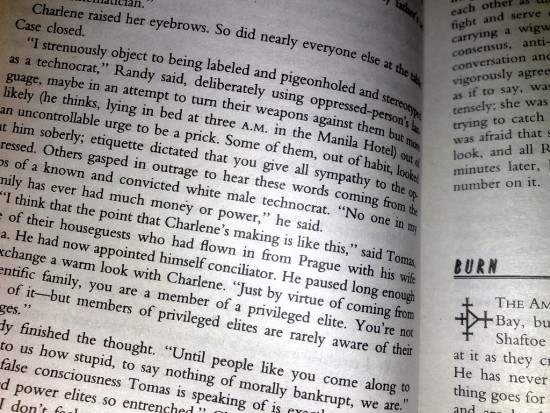How Many Paragraphs Is 1,000 Words?

So given you need to transform your 1,000 words into something easy on the eyes, you know you have to split it into paragraphs. How do you do that?
A Sentence Is an Idea, a Paragraph Is Closely Related Ideas
Whatever you’re discussing, you’ll discover a number of concepts which you presumably planned before you started writing. To make it all hang together nicely, you add a bit of space when you transition from one area of discussion to another. As with any rule, there are exceptions, but broadly speaking, essay writing and academic writing calls for paragraphs in the 100-200 word range.
Bear in mind that academic and essay writing usually means you’re writing for a fairly dedicated reader, but what about the huge chunk of the population who are frightened off by big chunks of text, even if they are only six or seven lines long (depending on font)?
Journalists and Commercial Writers Keep Their Paragraphs Short
“White space” is a wonderful illusion that tells your reader what you have to say is pretty easy to take in. I’ve seen some news articles in which each paragraph is only one sentence long. I feel that’s taking it to extremes, and it can have the opposite effect of making your writing look disjointed. I like to see at least three or four lines to a paragraph, and as an indication, my longest paragraph so far is just 74 words long.
You can assume commercial writing and news reports will have paragraphs approximately half as long as the ones you’d see in academic or essay writing. In this case, we’re looking at ten to twenty paragraphs per 1,000 words instead of five to ten.
Dialogues Have a New Paragraph for Every New Speaker
One context in which a paragraph can be as short as five characters is direct speech involving two or more speakers.
“Oh!”
Count ’em: two characters for the word, and three for the punctuation marks. To begin with, you’d introduce or refer to your speakers, but once the conversation is flowing nicely, you can start skipping them at times.
“No!” exclaimed Mary.
“Yes!” John couldn’t help being amused at Mary’s surprise.
“You don’t really mean it, do you?”
“Of course I mean it, silly!”
It’s a lot less cumbersome to skip a mention of the speaker than to add “said Mary” and “John said” after every direct quote. So theoretically, you can have a paragraph consisting of one word plus punctuation marks. 1,000 words in direct speech would therefore mean you’d write way more than the five or ten paragraphs our initial guideline suggested.
How Many Paragraphs in 1,000 Words?
Here’s a basic summary.
- Probably not less than 5 paragraphs.
- For easy reading, probably no less than 10.
- For direct speech, one for every time you change speaker (however many times that is).
Does It Matter?
Not necessarily, but bear in mind that even teachers who are paid to read students’ writing get tired eyes. The easier it is to read and understand what you have written, the more likely your teacher is to notice those clever details you included. There’s also a distinct possibility they won’t start hating you while they read your work. Yes, they’re supposed to be unbiased, but everyone is human!
When writing in other contexts: an article, a blog, or a book, keeping paragraphs short helps to hold your reader’s attention. Yes, there are famous writers who just wrote without much attention to paragraphs, or even punctuation, but their work isn’t an easy read, and no matter how educated we may be, “easy” is invariably the preferred option.
To take easy reading to the next level, try using sub-headers every paragraph to three paragraphs. This is applicable to blogs and web pages, and to a certain extent, in academic writing. When you hit a web page for info, what do you do? I look at the header, and then I scan the sub-heads to get an idea of the writer’s approach to the subject. If it looks like fluff, I kill the page and move on. But if the sub-headers are interesting, and seem to tell me there’s something worth learning, I’ll read the whole piece.
Whatever You Do, Use Paragraphs
Using paragraphs well (with or without sub-heads) makes your work more accessible to your reader, and, to a certain extent, it shows you’ve ordered your thoughts and are discussing one point at a time. If you can’t organize your work into paragraphs consisting of related thoughts, you may be jumping around too much. Check it out and try again.
How Many Paragraphs is…
The following list is an approximation for those who are writing essays with the standard 100 – 200 words per paragraph and 50 to 100 words for blog or article easy reading. The actual number of paragraphs will depend on numerous factors and this is nothing more than a general rough estimate. Below are estimated words to paragraphs conversions:
- 250 words is 1 to 3 paragraphs for essays, 3 to 5 paragraphs for easy writing
- 500 words is 3 to 5 paragraphs for essays, 5 to 10 paragraphs for easy writing
- 750 words is 4 to 8 paragraphs for essays, 8 to 15 paragraphs for easy writing
- 1000 words is 5 to 10 paragraphs for essays, 10 to 20 paragraphs for easy writing
- 1500 words is 8 to 15 paragraphs for essays, 15 to 30 paragraphs for easy writing
- 2000 words is 10 to 20 paragraphs for essays, 20 to 40 paragraphs for easy writing
- 2500 words is 13 to 25 paragraphs for essays, 25 to 50 paragraphs for easy writing
- 3000 words is 15 to 30 paragraphs for essays, 30 to 60 paragraphs for easy writing
- 4000 words is 20 to 40 paragraphs for essays, 40 to 80 paragraphs for easy writing
- 5000 words is 25 to 50 paragraphs for essays, 50 to 100 paragraphs for easy writing
Below are estimated paragraphs to words conversions:
- 1 paragraph is 100 – 200 words for essays, 50 – 100 words for easy writing
- 2 paragraphs is 200 – 400 words for essays, 100 – 200 words for easy writing
- 3 paragraphs is 300 – 600 words for essays, 150 – 300 words for easy writing
- 4 paragraphs is 400 – 800 words for essays, 200 – 400 words for easy writing
- 5 paragraphs is 500 – 1,000 words for essays, 250 – 500 words for easy writing
- 6 paragraphs is 600 – 1,200 words for essays, 300 – 600 words for easy writing
- 7 paragraphs is 700 – 1,400 words for essays, 350 – 700 words for easy writing
- 8 paragraphs is 800 – 1,600 words for essays, 400 – 800 words for easy writing
- 9 paragraphs is 900 – 1,800 words for essays, 450 – 900 words for easy writing
- 10 paragraphs is 1,000 – 2,000 words for essays, 500 – 1,000 words for easy writing
- 15 paragraphs is 1,500 – 3,000 words for essays, 750 – 1,500 words for easy writing
- 20 paragraphs is 2,000 – 4,000 words for essays, 1,000 – 2,000 words for easy writing
- 25 paragraphs is 2,500 – 5,000 words for essays, 1,250 – 2,500 words for easy writing
- 50 paragraphs is 5,000 – 10,000 words for essays, 2,500 – 5,000 words for easy writing
- 100 paragraphs is 10,000 – 20,000 words for essays, 5,000 – 10,000 words for easy writing

